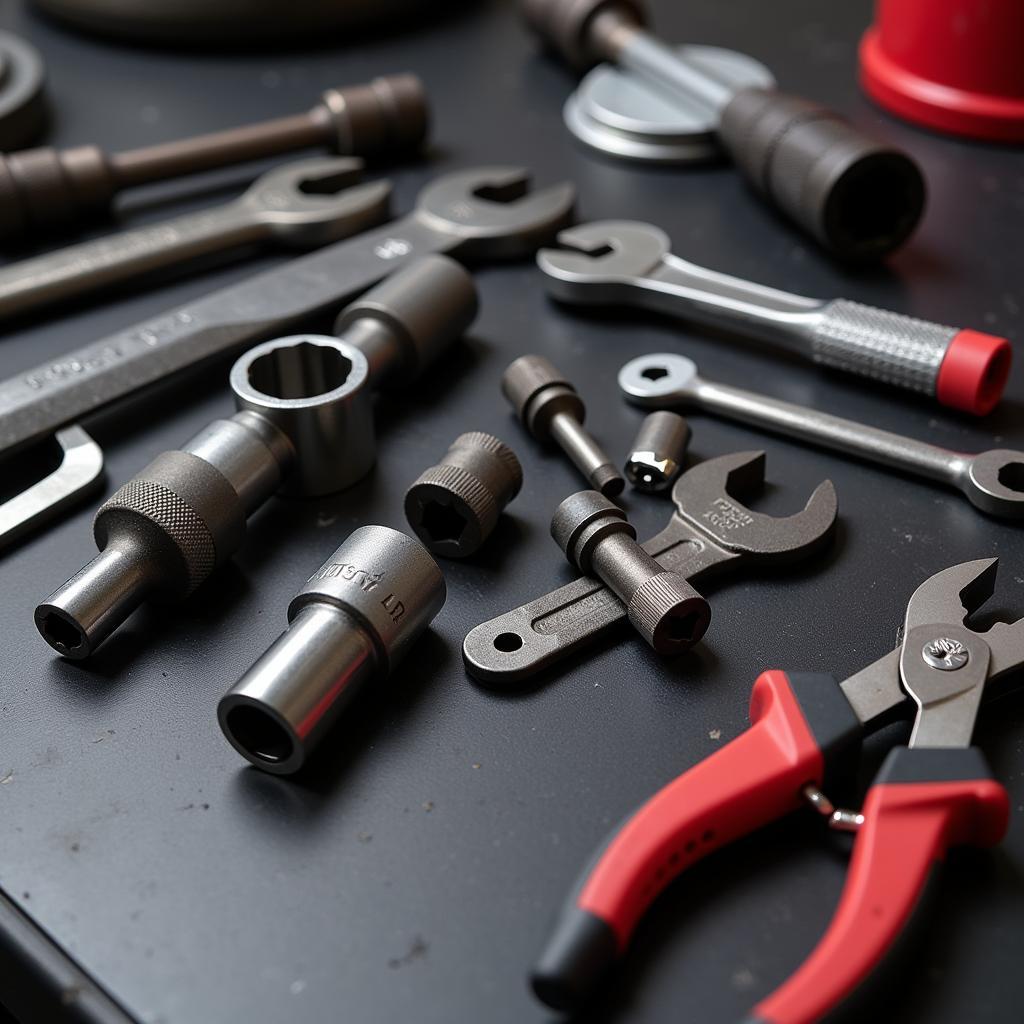German cars are renowned for their precision engineering, sophisticated technology, and high performance. Working on these vehicles requires specialized knowledge and, crucially, the right german car specialty tools. Whether you’re a professional mechanic or a dedicated DIY enthusiast, having the correct tools is essential for efficient repairs, accurate diagnostics, and maintaining the integrity of these finely tuned machines.
Investing in quality german specialty car tools is not just about getting the job done; it’s about doing it right. From specialized sockets and wrenches designed for intricate engine components to diagnostic software capable of deciphering complex electronic systems, the correct tools empower you to work with confidence and achieve professional-grade results. This comprehensive guide will delve into the essential specialty tools required for working on German cars, covering everything from basic hand tools to advanced diagnostic equipment.
Essential Hand Tools for German Cars
Every mechanic, professional or amateur, needs a solid foundation of hand tools. For German cars, this foundation includes several specialized tools designed to address the unique engineering found in these vehicles.
- Triple Square (XZN) Sockets: These star-shaped sockets are ubiquitous in German cars, used for everything from interior trim to engine components. A comprehensive set is a must-have.
- Torx Sockets and Wrenches: Similar to triple squares, Torx fasteners are common in German vehicles, particularly in braking systems and suspension components.
- Offset Wrenches: These wrenches allow access to fasteners in tight spaces, a frequent occurrence when working on German engines.
- Hose Clamp Pliers: German cars often utilize unique hose clamps requiring specialized pliers for removal and installation.
 Essential German Car Hand Tools
Essential German Car Hand Tools
Diagnostic Tools for German Vehicles
Modern German cars are packed with sophisticated electronics. Diagnosing issues requires specialized equipment capable of communicating with these systems.
- OBD-II Scanners: A high-quality OBD-II scanner is indispensable, providing access to fault codes, live data, and other crucial diagnostic information.
- VW/Audi Specific Scan Tools (VCDS): For Volkswagen and Audi vehicles, a VCDS (VAG-COM Diagnostic System) provides in-depth access to the vehicle’s control modules, enabling advanced diagnostics and coding.
- BMW Specific Scan Tools: Similarly, BMWs require dedicated scan tools like INPA or ISTA-D for comprehensive diagnostics and coding.
- Mercedes-Benz Specific Scan Tools (XENTRY/DAS): Mercedes-Benz vehicles also necessitate specialized software like XENTRY/DAS for accessing and diagnosing their complex electronic systems.
Specialized Tools for Specific Repairs
Beyond the basics, certain repairs on German cars demand unique tools.
- Camshaft Alignment Tools: Essential for timing belt or chain replacements, these tools ensure precise camshaft synchronization.
- Fuel Injector Pullers: Removing stuck fuel injectors can be a nightmare without the correct puller.
- Brake Caliper Piston Reset Tools: These tools are needed to compress the pistons in brake calipers when replacing brake pads.
Why Invest in Car Special Tools?
The answer is simple: quality, efficiency, and precision. Using the correct tools needed to make german cars not only makes the job easier but also prevents damage to delicate components. Investing in these tools is an investment in your car’s longevity and performance.
“Having the right tools is half the battle,” says Hans Gruber, a master mechanic with over 20 years of experience specializing in German automobiles. “It’s the difference between a frustrating afternoon and a successful repair.”
Choosing the Right German Specialty Car Tools
When selecting tools, prioritize quality and durability. While budget-friendly options might be tempting, investing in reputable brands often pays off in the long run.
“A cheap tool is a costly tool,” warns Helga Schmidt, another seasoned German car specialist. “Investing in quality saves you money and headaches in the long run.”
Conclusion
Working on German cars requires a specialized approach and the right tools. Investing in high-quality german car specialty tools empowers you to maintain and repair these vehicles effectively, ensuring their optimal performance and longevity. From basic hand tools to advanced diagnostic equipment, choosing the right tools is crucial for any enthusiast or professional working with German automobiles.
FAQ
- What are the most common specialty tools needed for German cars? Triple square sockets, Torx sockets, and OBD-II scanners are essential starting points.
- Why are specialized tools necessary for German cars? German engineering often incorporates unique fasteners and complex electronic systems requiring dedicated tools.
- Where can I purchase quality German Car Specialty Tools? Reputable online retailers and automotive tool suppliers are good sources.
- Are expensive tools always better? Not necessarily, but prioritizing quality and reputable brands is generally advisable.
- What are some good resources for learning more about German car repair? Online forums, repair manuals, and YouTube channels can be valuable resources.
Need assistance with car diagnostics or repairs? Contact us via WhatsApp: +1(641)206-8880, Email: [email protected] or visit us at 910 Cedar Lane, Chicago, IL 60605, USA. We have a 24/7 customer support team ready to help. Check out our articles on how to remove kenwood car stereo without tool and car audio clip removal tool for more helpful tips.

Leave a Reply